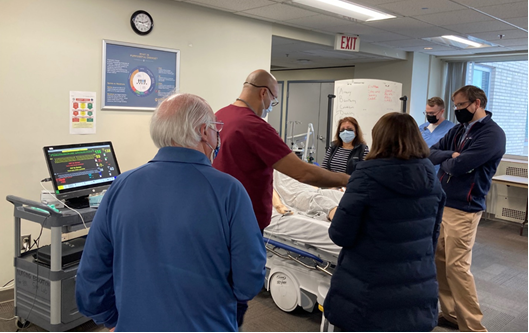VHA SimLEARN
Simulation Course Used to Help Care for Critically Ill Patients at VA Puget Sound
By: Yvonne Lin-Chen, RN, MN, CHSE, Nurse Educator | Sim Lab
Matthew Wemple, MD, Intensivist | Department of Pulmonary/Critical Care Medicine
Arthur J. French MD, MPH, MS, FACEP, CHSE, Emergency Physician | Emergency Medicine Section, National SimLEARN Clinical Faculty, VA Puget Sound Health Care System
Robert Howell (RN, Rapid Response Team/Surgical ICU) is reporting the assessment finding to his team for further consultation of patient’s condition. Clockwise: Khairunnissa Rajwani (MD, Emergency Medicine), Richard Barker (RN, Critical Care Nurse educator), Matthew Wemple (MD, intensivist), Sandra Demars (Hospitalist), Arthur French (MD, Emergency Medicine).
Photograph by Yvonne Lin-Chen.
VA Puget Sound Health Care System's (VAPSHCS) Critical Care Team and Nursing Education Simulation Program offered an on-site Fundamental Critical Care Support (FCCS) course, which is licensed by the Society of Critical Care Medicine (SCCM). This on-site course was facilitated by the Simulation Learning, Evaluation, Assessment and Research Network (SimLEARN).
The goal of this course is to support the staff in managing the initial care of critically ill patients for the first 24 hours or until appropriate critical care support can be achieved (Fundamental Critical Care Support, 2021). We had face-to-face training so we could address the knowledge gap in qualified clinicians who can facilitate fundamental critical care support using simulation modalities. This course introduces principles in a series of integrated lectures and in-person skill stations to provide knowledge, guidance for decision making and some limited clinical procedures practice. Topics included are: recognition of a seriously ill patient, noninvasive positive pressure ventilation (NPPV), high flow nasal oxygenation (HFNO), awake proning protocol, mechanical ventilation, COVID-19 respiratory failure management, ethics in critical care medicine, end-of-life comfort care, gastrointestinal bleeding with massive transfusion protocol (Fundamental Critical Care Support, 2021).
A total of 6 participants from the internal medicine, rapid response, emergency medicine, and critical care disciplines attended the course. The Critical Care Team and Nursing Education Simulation Program received positive feedback from participants which included learning troubleshooting skills for mechanical ventilation, effective team communication, decision-making in ethics, problem solving skills, and NPPV usage. The next step for the FCCS course at VAPSHCS is to have a dedicated FCCS course director on-site to support ongoing FCCS courses. Trained FCCS faculty, Dr. Matthew Wemple and Dr. Arthur French, presented the course with SimLEARN’s virtual support on November 16-17, 2021.
References:
Killu, K. (2018). The Fundamentals of Critical Care Support: Local experience and a look into the future. Acute medicine & surgery, 5(4), 305-308.
Fundamental Critical Care Support: Prepare nonintensivists to manage critically ill patients (2021). Society of Critical Care Medicine, Retrieved from https://www.sccm.org/Education-Center/Educational-Programming/Fundamentals/Fundamental-Critical-Care-Support



















